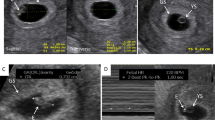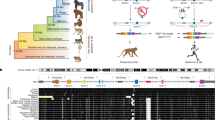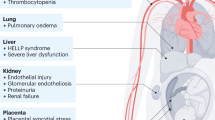Abstract
STUDIES in the rat have demonstrated that surgical reduction of litter size (LR = litter reduction) in the first half of pregnancy results in growth enhancement of the surviving placantae and foetuses at term1–3. In addition to providing a useful preparation for studying relationships between structure and function during development, this technique may offer some insight into the mechanisms which regulate foetal and placental growth. We observed recently that LR at a later stage of pregnancy (day 13) produced no increments in either placental or foetal weight in the survivors3. At this time, the operation seems to be more traumatic for the mother, and this may account for our failure to observe growth enhancement. Alternatively, the mechanisms which regulate growth may be impervious to influence at this later stage. However, an additional feature of LR at day 13 in our previous study was the survival of several placentae without foetuses. The chorio-allantoic or true placentae is formed in mid-pregnancy, and LR after this time may result in foetal death without placental death4. Apparently, such (supernumerary) placentae retain their endocrinological integrity5, and we have suggested that their presence may inhibit the expression of growth enhancement in surviving foeto-placental units3. We distinguish here between these various possibilties experimentally by reducing the litter size at day 13 both with and without the survival of supernumerary placentae. The results strongly suggest that these placentae are responsible for inhibition of placental and foetal growth enhancement.
This is a preview of subscription content, access via your institution
Access options
Subscribe to this journal
Receive 51 print issues and online access
$199.00 per year
only $3.90 per issue
Buy this article
- Purchase on Springer Link
- Instant access to full article PDF
Prices may be subject to local taxes which are calculated during checkout
Similar content being viewed by others
References
van Marthens, E. & Grauel, I. Nutr. Metab. 17, 198–204 (1974).
van Marthens, E., Grauel, L. & Zamenhof, S. Biol. Neonate 25, 53–56 (1975).
Croskerry, P. G., Smith, G. K., Hall, S. & Shepard, B. J. Biol. Neonate (in the press).
Huggett, A. St. G. & Pritchard, J. J. Proc R. Soc. Med. 38, 261–266 (1945).
Petropoulos, E. A. Acta. Endocr., Copenh. 73, suppl. 176, 1–69 (1973).
Barr, M., Jensh, R. P. & Brent, R. L. Am. J. Anat. 128, 413–428 (1970).
Zamenhof, S., Bursztyn, H., Rich, K. & Zamenhof, P. J. J. Neurochem. 11, 505–509 (19764).
Burton, K. Biochem. J. 62, 315–323 (1956).
van Marthens, E. & Zamenhof, S. Expl Neurol. 23, 214–219 (1969).
Csapo, A. I., Dray, F. & Erdos, T. Lancet ii, 51–52 (1974).
Csapo, A. I. & Wiest, W. G. Endocrinology 93, 1173–1177 (1973).
Linkie, D. M. & Ninswender, G. D. Biol. Reprod. 8, 48–57 (1973).
Author information
Authors and Affiliations
Rights and permissions
About this article
Cite this article
CROSKERRY, P., DOBBING, J. Placental inhibition of foetal growth enhancement in the rat. Nature 273, 147–149 (1978). https://doi.org/10.1038/273147a0
Received:
Accepted:
Issue Date:
DOI: https://doi.org/10.1038/273147a0
This article is cited by
Comments
By submitting a comment you agree to abide by our Terms and Community Guidelines. If you find something abusive or that does not comply with our terms or guidelines please flag it as inappropriate.



